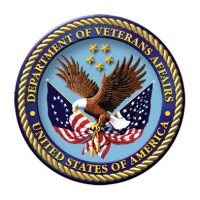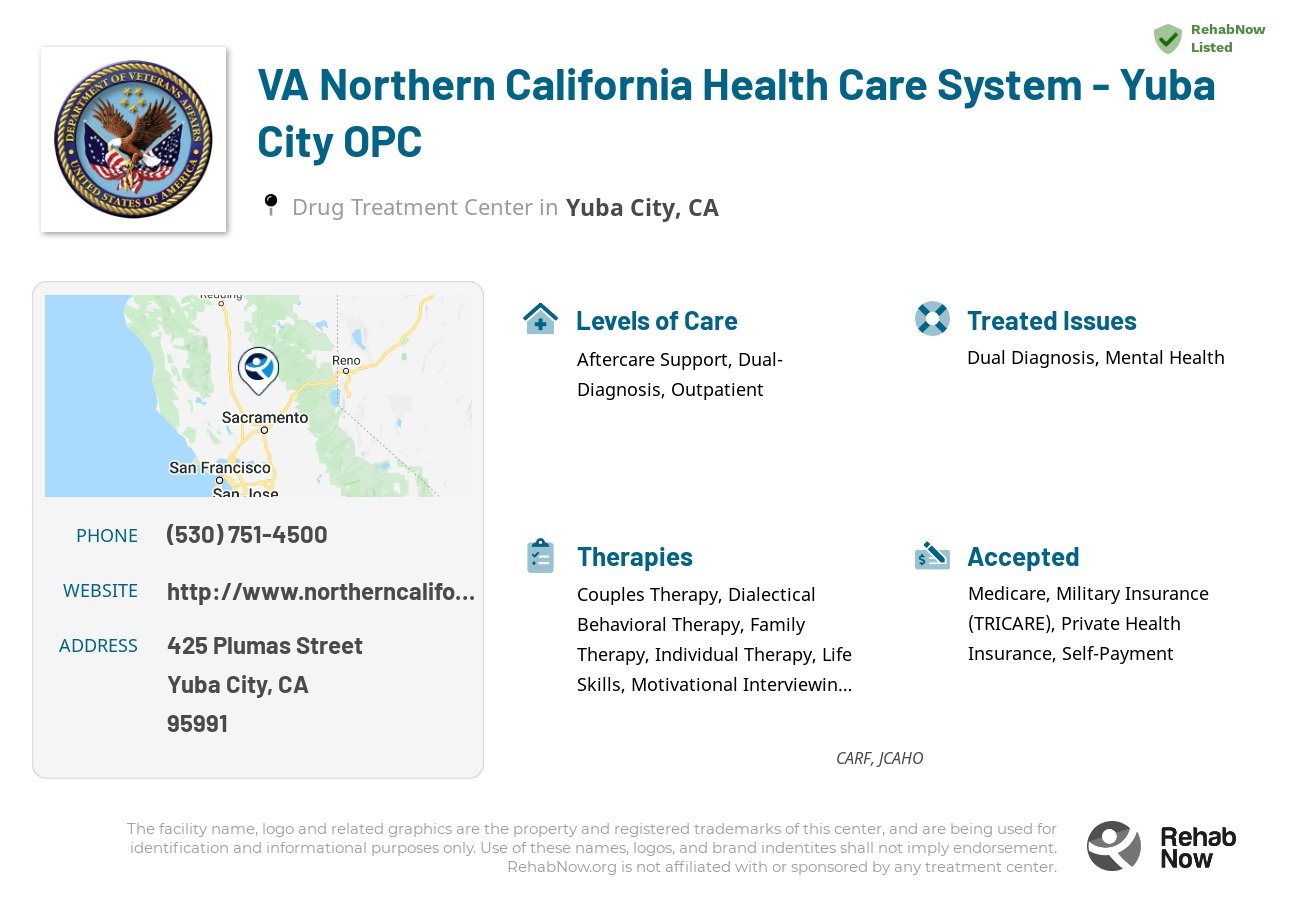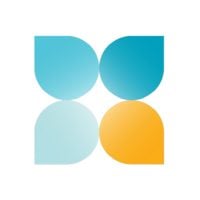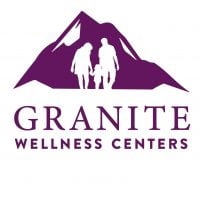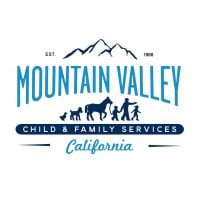About VA Northern California Health Care System - Yuba City OPC in California
VA Northern California Health Care System - Yuba City OPC is a licensed and accredited private rehab located in Yuba City, California specializing in Dual Diagnosis (Co-Occuring Disorders), Mental Health, and Addiction Treatment. This facility provides Aftercare Support, Dual-Diagnosis, Outpatient levels of care, specifically structured for each individual.
This facility can help you quit drugs and live a sober life. This facility offers evidence-based treatment methods for drug addicts who want to change their lives for good. Patients are surrounded by compassionate staff members who understand what you are going through and will support your journey towards sobriety every step of the way. This facility accepts both men and women. Treatment here is offered to all genders, and they also notably support LGBTQ+.
When selecting a treatment facility, accreditations are clearly important. VA Northern California Health Care System - Yuba City OPC maintains a CARF Accreditation. JCAHO has Accredited this facility. Payment methods here are Medicare, Military Insurance (TRICARE), Private Health Insurance, Self-Payment, Sliding Scale and potentially more case-based methods are available. Since VA Northern California Health Care System - Yuba City OPC accepts health insurance, get help from our experts to find a facility that accepts your plan.
Genders
Ages
Modality
Additional
Accreditations

JCAHO

CARF
The Commission on Accreditation of Rehabilitation Facilities (CARF) is a non-profit organization that specifically accredits rehab organizations. Founded in 1966, CARF's, mission is to help service providers like rehab facilities maintain high standards of care.
Conditions and Issues Treated
Recovery is not simply about stopping drug use. Recovery is working with addiction while recovering mental health issues that are fueling the addiction in the first place.
Levels of Care Offered
This center offers a variety of custom treatment tailored to individual recovery. Currently available are Aftercare Support, Dual-Diagnosis, Outpatient, with additional therapies available as listed below.
Outpatient treatment is considered the lower intensity level of addiction treatment. It’s ideal for early phase addiction or lower intensity addictions. It may include weekly sessions instead of daily. It may include weekly sessions instead of daily. Peer group support, 12-step programs, and individual counseling may still be involved but at a lesser frequency than an intensive outpatient program. It is a good choice for someone who doesn’t need to go through a medically supervised detox and who has a supportive home environment. It requires motivation and dedication to commit to the program without constant monitoring.
Aftercare support should take place after outpatient treatment has ended. There are a few different types of aftercare support that patients can seek. These include 12 Step, Self-help groups (AA, NA), Therapeutic communities, Long-term, structured sober living arrangements, and Halfway houses (residential treatment centers).
Therapies & Programs
Individual therapy involves one-on-one sessions between the patient and therapist. It provides patients with a safe environment to openly discuss personal and sensitive issues with the therapist. They find the therapist as someone they can trust. Individual therapy aims to identify the core issues that would have led the patient to substance abuse and address them effectively. The therapist can develop patient-specific customized solutions through individual therapy, which aids speedier recovery.
Couples therapy works with clients and significant others in a professional capacity to improve relationship dynamics. This can be helpful for addicts who are trying to marry the idea of recovery into their work, family, social lives – any aspect that has to do with relationships.
Through counseling sessions, addicts will have an opportunity to talk about their addiction with professional partners. These partners can offer feedback and advice on how to get sober while keeping healthy relationships intact. A good couples therapist will help addicts understand their part in an unhealthy relationship dynamic or find ways to deal with anger or resentment from significant others outside of the home.
Family therapy is a group problem-solving that aims to improve communication and relationships between the addict, their family, and sometimes friends. The main goal of family therapy for drug addiction is to create an environment where communication can occur without judgment, hostility, or blame. The therapist is with the family as they learn to communicate differently, especially with the addict when s/he is using. The family can learn to reduce their enabling behavior or rally together and support each other during tough times.
An addict’s family can play a vital part in helping them to avoid relapse because they can spot the warning signs and help them get back on track before it becomes too much of a problem. Family therapy is one of the most effective ways to help addicts stay on the path to long-term sobriety. When a drug addict decides that they want to try and get sober, it takes the support of every person they love to succeed. It can be incredibly difficult for loved ones to watch an addict go through the pain and suffering of withdrawal, but by being there with them and supporting them, they can help to make sure that the addiction never returns.
In general, trauma therapy is a clinical process that helps individuals deal with mental stress often caused by traumatic events. The therapist helps the person identify, understand, and work through the problem. This is done with the help of talking about it in group or one-on-one counseling sessions. Therapists use relaxation, role-playing, art, and music to help the person open up about what is bothering them.
There are many different types of trauma therapists, such as psychiatric nurses and counselors. Not everyone is a good candidate for this type of therapy; it is generally reserved for people who have recently experienced a traumatic event and struggle to get over it. It is often done for children, teenage victims of sexual assault, and war veterans.
Dialectical Behavior Therapy (DBT) is a type of therapy created in the late 1980s and early 1990s to help people with high rates of suicidal behavior. DBT helps people learn how to live a life that is no longer controlled by overwhelming emotions and urges. It is beneficial in treating drug addiction because it helps patients understand and cope with their cravings for drugs or alcohol rather than turning to those substances as a way of coping.
There is hope for people who are addicted to drugs and alcohol. Cognitive Behavioral Therapy (CBT) is the solution. CBT focuses on the underlying thoughts and behaviors that caused the addiction problem in the first place and may cause a relapse. This type of psychotherapy addresses negative feelings common in substance abuse disorders. It helps to change them by restructuring thought patterns. It’s about removing negative thoughts and providing long-term benefits while promoting self-awareness, self-control, and healthy ways to respond to negative thoughts. These sessions can be done by themselves or as part of combination therapy.
Since addiction is a chronic physical and mental illness, addicts need to learn as many life skills as possible. Many drug treatment centers offer life skills activities as part of their addiction recovery programs. Examples include cooking classes, employment training, resume writing seminars, parenting classes, and computer training. Life skills activities help addicts find employment, take care of their families, and give back to the community.
Payment Options Accepted
For specific insurance or payment methods please contact us.
Is your insurance accepted?
Ask an expert, call (888) 674-0062
VA Northern California Associated Centers
Discover treatment facilities under the same provider.
- VA Northern California Health Care System - McClellan Clinic in McClellan Afb, CA
- VA Northern California Health Care System - Sacramento VA Medical Center in Mather, CA
- VA Northern California Health Care System - Chico VA Clinic in Chico, CA
- VA Northern California Health Care System - Fairfield Clinic in Travis Afb, CA
- VA Northern California Health Care System - Mare Island Clinic in Suisun City, CA
Learn More About VA Northern California Centers
Additional Details
Specifics, location, and helpful extra information.
Yuba City, California 95991 Phone Number(530) 751-4500 Meta DetailsUpdated November 25, 2023
Staff Verified
VA Northern California Health Care System - Yuba City OPC Patient Reviews
There are no reviews yet. Be the first one to write one.
Yuba City, California Addiction Information
More than 3 million of California's citizens are addicted to illegal drugs. Almost 800,000 people use hard drugs, almost 5 million use marijuana, and another 2.1 million abuse alcohol every year. Other substance abuse issues such as binge drinking and teen drug use are also common. Many illegal drugs such as cocaine, heroin, methamphetamine, and marijuana are smuggled into the state from Mexico.
Over 1,000 admissions to drug rehab facilities and almost 2,000 hospitalizations related to drug abuse in Yuba City, CA in 2016. In 2012-2013, there were a total of 4,398 admissions to drug and alcohol rehab centers in Yuba City. Many resources are available to help you find the best drug treatment facility to get sober, and talking to a professional about your options can be incredibly helpful.
Treatment in Nearby Cities
- Lancaster, CA (362.2 mi.)
- Thousand Oaks, CA (376.2 mi.)
- Encinitas, CA (485.8 mi.)
- West Covina, CA (405.4 mi.)
- Pleasanton, CA (102.9 mi.)
Centers near VA Northern California Health Care System - Yuba City OPC
The facility name, logo and brand are the property and registered trademarks of VA Northern California Health Care System - Yuba City OPC, and are being used for identification and informational purposes only. Use of these names, logos and brands shall not imply endorsement. RehabNow.org is not affiliated with or sponsored by VA Northern California Health Care System - Yuba City OPC.
